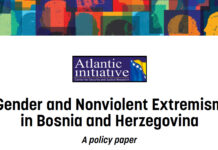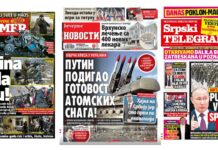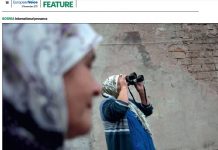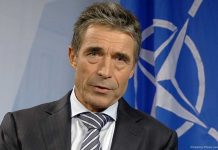MOSCOW — Russian President Dmitry Medvedev has vowed to punish those behind a devastating bombing attack at Moscow’s busiest airport, as Muscovites reeled from the carnage that killed 35 people and wounded more than 150 others. Russians all across the country were preparing for a day of mourning on January 26 to honor the victims of the tragedy.
Medvedev was speaking in an emotional, televised speech after observing a moment of silence during which he choked back tears.
“Everything possible must be done so that the bandits who committed this crime are identified, exposed, and brought to court, and the nests of these bandits — or whatever they may be called — must be destroyed,” Medvedev said. “Those who offer resistance must be dealt with rigorously. They must be destroyed on the spot.”
Prime Minister Vladimir Putin, too, stated that “retribution is inevitable.”
Medvedev also had harsh words for Domodedovo airport’s managers.
He said security lapses at the airport had enabled a suicide bomber on January 24 to detonate explosives in a crowded arrivals hall, filling the room with smoke and sparking a bloodbath.
“Obviously there are systemic shortcomings in ensuring the security of people and in the management of this transportation hub,” Medvedev said.
He ordered the Interior Ministry to recommend transport security officials for dismissal and warned that authorities found guilty of security would be brought to account.
“What happened shows that there were clear security violations. Moving such an amount of explosives requires real effort,” Medvedev said.
Criticism Rejected
Medvedev said Russian authorities had ordered airports to strengthen security rules after suicide bombers in 2004 smuggled explosives through security at Domodedovo and illegally bought tickets from airport staff before blowing up two planes in midair. The twin attacks killed 90 people.
“Unfortunately,” he said in a statement released by the Kremlin early on January 25, “we far from always implement even the most important legislation.”
Domodedovo’s management was quick to reject the criticism, insisting its security measures met all the requirements.
“Absolutely each entrance at Moscow Domodedovo Airport is equipped with metal detectors for screening passengers and X-ray machines for checking baggage,” airport spokeswoman Yelena Galanova said. “All of the machines are in working condition and have the necessary certificates with acceptable periods of use in service.”
Airport officials also argued that checking people entering the arrivals area is actually the responsibility of transport police, not airport security.
Security experts, however, largely confirm that security is lax at Domodedovo, the largest of Moscow’s three major airports, which handled more than 22 million passengers last year.
Semyon Baru is a scientist at the Russian Academy of Science’s Institute of Nuclear Physics in the Siberian city of Novosibirsk, which develops X-ray security gates for airports.
He says Domodedovo authorities purchased one of the institute’s gates but have since permanently turned it off on the grounds that it allegedly emits dangerous radiation.
The security check at the entrance of the airport, he says, is a mere “formality.”
“The metal detector gates that people who enter the airport go through — and this is not even always the case — detect only metal,” Baru says. “Explosive belts, which can fit several kilograms of explosives, don’t contain any metal.”
Nonetheless, some commentators point out that no airport in the world is 100-percent safe from terror attacks, and that ultimately the blame lies with the Russian security service for failing to uncover the plot against a target as prominent as Domodedovo Airport.
Suspicion Falls
There has been no immediate claim of responsibility for the attack, but suspicion has fallen on Islamic militants in Russia’s volatile North Caucasus.
Investigators cited in Russian media said the attack was carried out by a heavily built man in his 30s. Other reports have suggested a female suicide bomber could also have been involved, along with another man.
North Caucasus rebels have claimed responsibility for a series of attacks in Russia, the deadliest of which was the 2004 hostage-taking at a school in Beslan that left more than 330 hostages dead.
In March 2010, two female suicide attackers from Daghestan killed 40 commuters in Moscow’s metro.
If the airport attack was carried by North Caucasus insurgents, the choice of Domodedovo international arrivals suggests the attackers wanted to make an impact abroad.
The Emergency Situations Ministry says eight foreigners were among the dead in the Domodedovo attack: two Britons, a German, and citizens of Bulgaria, Kyrgyzstan, Tajikistan, Uzbekistan, and Ukraine.
Some experts, however, warn against jumping to conclusions about who perpetrated the attack.
Caucasus ‘Very Convenient’
Ruslan Martagov is a Chechen journalist and political scientist who formerly worked as an analyst at the Moscow-based Antiterror Foundation.
“I wouldn’t talk about a Caucasus trail — or any other trail — yet,” he says. “An investigation must be conducted. But there’s one thing I can say. For Russian authorities, the Caucasus has become very convenient. As soon as elections approach, as soon as the country’s socioeconomic situation worsens, explosions and bombings start happening. And every time, we’re told the trail leads to the Caucasus. In the end, all this consolidates the power vertical.”
What is certain is that the attack has dented confidence in Russian security as the country prepares to hold the 2014 Winter Olympics in Sochi, which borders the North Caucasus, and the 2018 World Cup.
The violence could also hurt foreign investment in Russia. Medvedev delayed his departure to the Swiss mountain resort of Davos, where he was due to court foreign investors on January 26 during an opening speech of the World Economic Forum.
written by Claire Bigg, with contributions from RFE/RL’s Russian Service (25. 01. 2011.)







